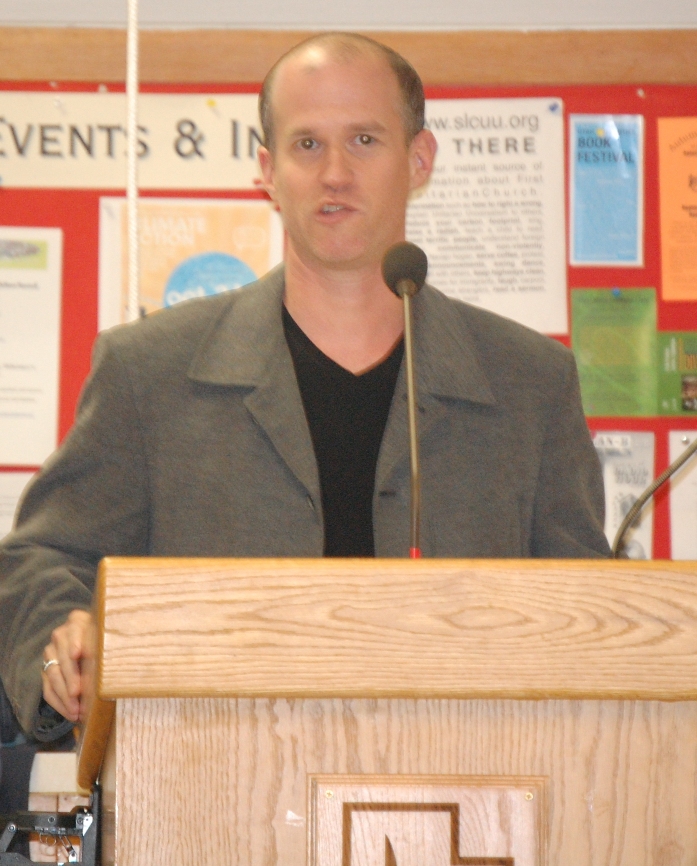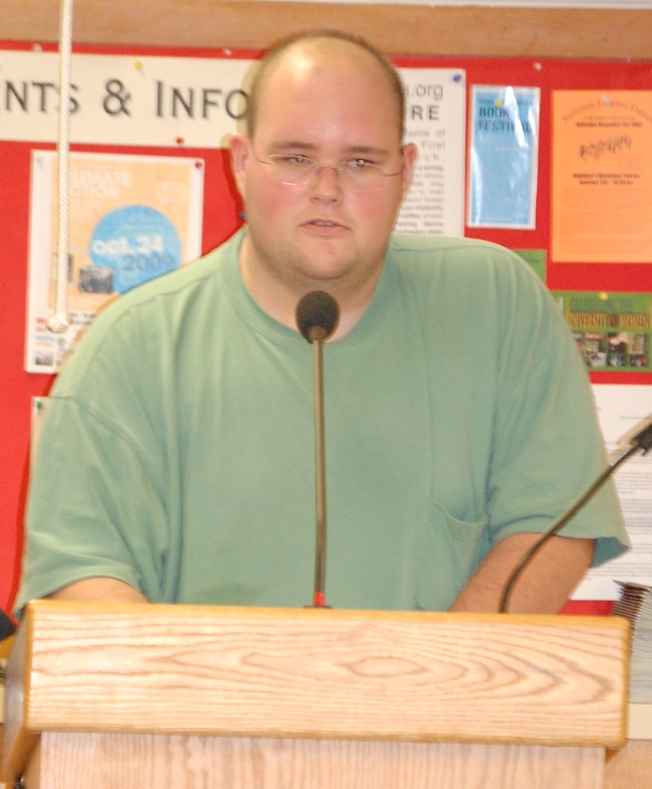November 2009
Contents
Thomas Paine Day 2009
Bruce Daine Speaks to Humanists of Utah
Starting off with a movie critique of HBO’s mini series about John Adams, Associate Professor Bruce Dain said that a movie about Thomas Paine would have been a better story. Why? For starters, Dain said that Paine believed in divorce, was separated and was remarried, had many personal problems. He antagonized people, was the most famous writer in America, and supported the American Revolution.
And almost killed in the French Revolution, Paine was not freed by the US government in France. So he blamed George Washington; this caused a big public fight though Washington was not at fault. Eventually James Monroe had him released from French jail.
Paine also became infamous for writing The Age of Reason, a defense of deism. This writing was vilified by the American founding fathers, even though most of them agreed with him. For example, John Adams loathed what Paine wrote yet agreed with virtually everything but didn’t think it was a good idea to express it in public.
Another interesting fact about Paine was that he died in NYC not quite impoverished but not well off either. Buried in a pauper-like grave, almost no one went to his funeral. Nearly a year passed before his followers and family moved him to a proper grave.
Though Paine’s life would have been a much better mini series than John Adams, he is ignored although educated people may have heard about him, said Dain, and the question is why. Dain said he was actually grateful about giving this talk, motivating him to read about Paine and think about him.
Paine was an exceedingly popular writer in the 18th century, Dain said, but he doesn’t seem to speak to us now, especially for the left, liberal, or university level. Something in Paine’s tone appeals to the right wing, which is why Glen Beck just published Glen Beck’s Common Sense. Unwilling to buy it, Dain said he went to a bookstore and read Beck’s book, adding that there is something in Beck’s tone that he got right about Paine.
Nevertheless there is much about Paine that does not fit into our sensibilities today, like his deliberate simplicity, radical anti-elitism, and contempt for protest against disinterest and objectivity in politics, which may be the biggest reason why he is forgotten. Paine identified himself completely with his ideas, never distinguishing between the private and public man, despising people who did; this set him apart from virtually all the other founding fathers. Plus he attacked them personally if he didn’t like their ideas since he believed that the idea and the man were the same things.
One of the famous lines from Common Sense was Paine’s belief that the American Revolution was important for all mankind. Interestingly, Paine disregarded “American” in American Revolution because America did not have hundreds of years of aristocracy; it was a democratic revolution first. To Paine, there was nothing special about Americans per se. In fact, they were only Americans if they acted out of principles that anyone could understand. Thus he thought he could and did export this idea to France and England.
Paine saw himself as a professional writer who owned his work, said Dain. As a result, he fought with the publisher of Common Sense for pocketing all the profit. Most publishers then believed that what the writer said and what his ideas were what was important, but the writer as a person did not own that; Paine despised this notion.
Paine cannot be admired as a learned man, continued Dain, because he was contemptuous of formal education believing it could lead to pride. Paine cannot be admired as a disinterested man who had a public persona different from his private person. He cannot be admired as a Founding Father; he hated class differences, lineage claims, and in many ways, nationalism. Paine considered himself universal and not as a real American.
Given all of this, it is surprising he is remembered though he is basically ignored, said Dain, adding that he thought it was undeserved because what he did was a major intellectual accomplishment and impressive in many ways. Furthermore, Paine had a sense of public leadership that did not exist then. In fact, Paine invented his own audience and spoke to it almost simultaneously.
Paine also invented a different way of writing that appealed to ordinary people who had a little education but could read and write. So his writing was not targeted to an audience of artisans, craftsmen, or farmers. Paine believed that ordinary people mattered and could shape politics just as much as anyone else. Simply to write a best selling political pamphlet was to create a new audience; what Paine did had never happened before in the US. Paine invented a political language of self-evident truths that was available to anyone.
According to Paine, the world’s glory and its logic and the ability to apprehend both is universal. In other words, science is available to anyone, and science has to be the basis for everything in public life, including religion; every person is able to apply scientific reasoning and evidence to politics and even to religion.
As an aside, Dain commented that the word “American” did not exist in its current form until after Common Sense; it was a bad word then. Thus, the new meaning for “American” is to act rationally and to be against corruption.
Paine argued that anybody with common sense, meaning reason, and if they lived in America and acted rationally, then this person would be a true American, and a true American would be willing to fight a revolution to leave the British Empire.
Paine expounded on this very subtly in Common Sense, Dain said, not calling for a revolution in the beginning, not until the last paragraph. He argued that monarchy was irrational and that anyone with any sense who did not have an interest in it would not want to be in a monarchy. That is pretty much all Common Sense says, asserted Dain, adding that there are many biblical references so it is not even that secular.
Later Paine said he could convince the British themselves to overthrow monarchy and aristocracy and all people to abandon notions of miracle, heresy, and orthodoxy, wanting to make faith a matter of scientific investigation open even to ordinary people.
By inventing a language to do that, in essence Paine trusted his audience to be able to fulfill the entire promise of the Enlightenment. Dain said educated people then believed that was possible. It was unusual for men like Adams and Jefferson to see themselves as natural aristocrats. Such people were not born into privilege but received privilege because they were smarter; they would think like Newton and Shakespeare, the great examples of reason and imagination, who were exceptional, not a state most people had access to. This is why Adams said the following about Paine:
“I am willing you should call this the Age of Frivolity as you do, and would not object if you had named it the Age of Folly, Vice, Frenzy, Brutality, Daemons, Bonaparte, Tom Paine, or the Age of the Burning Brand from the Bottomless Pit, or anything but the Age of Reason. I know not whether any man in the world has had more influence on its inhabitants or affairs for the last thirty years than Tom Paine. There can be no severer satyr on the age. For such a mongrel between pig and puppy, begotten by a wild boar on a bitch wolf, never before in any age of the world was suffered by the poltroonery of mankind, to run through such a career of mischief. Call it then the Age of Paine.” –John Adams
Adams believed that society could even be destroyed if anyone could access the ideas of aristocracies. For society to hold together, it had to be based on an aristocracy of the gifted.
Dain said Paine believed that all truth is available to all people at all times for observation and reason, and everything true is the result of science. If people abandon their prejudices, all men could be scientists. Consequently, all of Paine’s works seek to demolish all prejudices and to persuade people to put the American Revolution, French Revolution, a possible revolution in England, governments everywhere, and ultimately even all religions, on a rational scientific basis available to everyone.
–Sarah Smith
More pictures from the event!
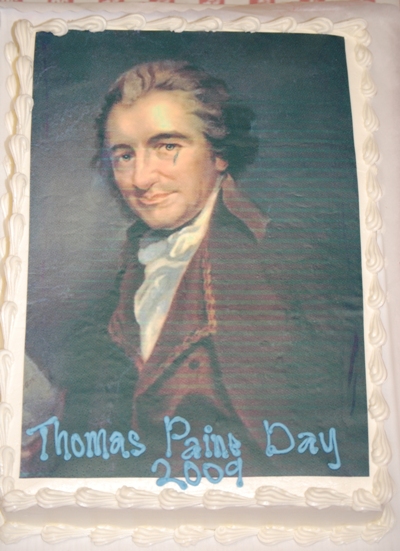
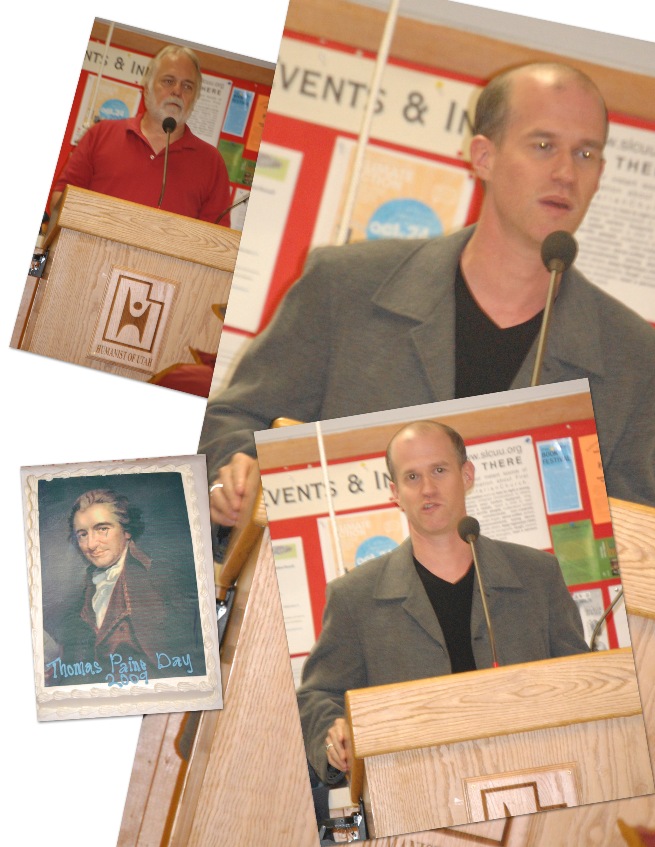

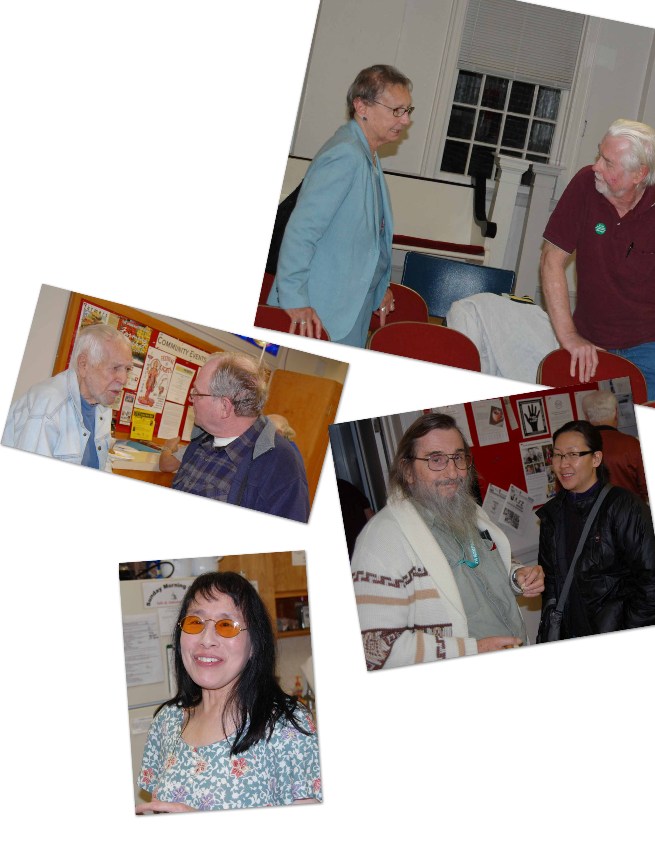
Marion Craig Essay Contest Winners
This year we had a number of excellent essays submitted to our annual Marion Craig Essay Contest. Ms. Craig left Humanists of Utah a very generous gift from her estate when she died. She wanted us to use it to promote humanism. Since she was a teacher we have sponsored several essay contests. The entries this year were the best we’ve ever had. All of them came from members of SHIFT, a group of secular students at the University of Utah. The first prize winner was Jason Cooperrider for his essay The Importance of Secularism in a Truly Democratic Society, second place went to Devin Richey for Why ‘Under God’ does not belong in the Pledge of Allegiance.
The Importance of Secularism in a Truly Democratic Society
One of the most vital aspects of a true democracy is the goal of having all its citizens in possession of equal rights and allowing its citizens to live a life that makes them happy, so long as doing so does not harm the rights of all other citizens within the democracy. Part of this goal necessarily incorporates the understanding that no one has the right to force one’s opinions/beliefs on another person; however, one is entitled to have any opinions/beliefs that one wants. These values, under the wisdom of the founding fathers, are written directly into the Constitution of the United States of America, but even modern American society struggles to maintain the integrity of such values, as they are under constant attack from many of the citizens they are meant to protect.
One such area where the attack on the values of freedom occurs repeatedly is the separation of church and state, also known as secularism. Secularism is vital to a healthy democracy. The purpose of secularism is to ensure that religious freedom is maintained and is not controlled by the government that is formed by the citizens of a society. In addition to guaranteeing that citizens have the right to practice whatever religion they desire (so long as doing so does not violate the rights or cause harm to other citizens), secularism is also meant to ensure that citizens who choose to practice one or no religion do not have any form of religion forced upon them. This includes keeping religion separate from government, which is meant to be representative of and ensure the rights of all its citizens.
Whenever religion is forced upon any of its citizens, whether it be by including “under god” in our Pledge of Allegiance or “in god we trust” on our currency, secularism is violated and the democracy as a whole suffers and is diminished to some extent. It is essential that those who choose not to practice a religion, or not to embrace theism per se, have their rights maintained just as fervently as those who do choose to practice a religion or to embrace theism. Simply, religion does not belong in any aspect of the government in a democratic, and thereby secular, society, else someone’s rights are being violated.
Not only is secularism beneficial to citizens without religion or theism, who do not wish to have the opinions/beliefs of others forced upon them, but is can also be very beneficial to those who do practice a religion or embrace theism. Secularism guarantees that all religious beliefs that do not violate anyone else’s rights and that do not cause harm to anyone else are tolerated by society. In fact, one of the truly wonderful byproducts of a democracy is widespread diversity. The more citizens there are with their own opinions/beliefs, the better society is as a whole, as diversity promotes new ideas and the spread of knowledge and understanding. Secularism leads to tolerance and diversity, which lead to absolute equality, the goal of any true democracy.
Many of the founding fathers, including Thomas Paine, worked very hard to make certain that secularism would be a crucial aspect of our democracy. In the Bill of Rights, the very first part of the very first amendment clearly establishes a secular society. This first amendment, known as the Establishment Clause, defines the basic rights of all the citizens of the democratic United States of America. It reads as follows: “Congress shall make no law respecting an establishment of religion, or prohibiting the free exercise thereof; or abridging the freedom of speech, or of the press; or the right of the people peaceably to assemble, and to petition the Government for a redress of grievances.” This one line unambiguously states that the government will not endorse (i.e., respect) any religion for its citizens, nor will it prevent any citizen from practicing a religion. Despite the lack of equivocation in this passage, there are still some citizens who would insist that the United States is a Christian nation, founded on Christian principles, as set forth by Christian authors of the Constitution. Those same citizens would have the government, which is representative of all its citizens, actively endorse Christianity, which is a clear violation of the secular society created by the founding fathers.
Thomas Paine, being the wise sage that he was, said several things that relate well to this argument. “He that would make his own liberty secure, must guard even his enemy from opposition; for if he violates this duty he establishes a precedent that will reach himself.” “It is always to be taken for granted, that those who oppose an equality of rights never mean the exclusion should take place on themselves.” By saying those things, he is means that it is in the best interest for all citizens to maintain the rights of other citizens, because not doing so threatens their own rights in the long-term. All citizens must endeavor to maintain and promote freedom: “Those who expect to reap the blessings of freedom must…undergo the fatigue of supporting it.” He also talks about how important secularism in particular is, when saying: “of all the tyrannies that affect mankind, tyranny in religion is the worst” and “persecution is not an original feature in any religion; but it is always the strongly marked feature of all religions established by law.” And, finally, a couple more bits of general wisdom from Mr. Paine that would solve the problems stated here and many others in society if all people would abide by them: “The most formidable weapon against errors of every kind is reason” and “the World is my country, all mankind are my brethren, and to do good is my religion.” These are the basic tenants of humanism.
–Jason Cooperrider
Why ‘Under God’ does not belong in the Pledge of Allegiance
“I pledge allegiance to my Flag and the Republic for which it stands: one nation indivisible with liberty and justice for all.”
These are the original words of the Pledge of Allegiance as written by Francis Bellamy in 1892. By reciting these lines, one swears their loyalty to a representation of the laws, rights, and freedoms of the United States of America. By adding the phrase “under God” into that pledge, the meaning of the words around it becomes sterile. That is because of the intrinsic conflict that comes when one violates liberty, law, and justice in the same breath used to claim support of these principles.
In America, each individual is born with the right to choose their own ideas and beliefs concerning life and existence. That is liberty from the arbitrary beliefs of others and is protected for us by the Bill of Rights in the Constitution. When a public institution requires a declaration of belief in an almighty God, it attempts to overrule all other possibilities that a person has a natural right to believe. Religion is “a set of beliefs concerning the cause, nature, and purpose of the universe” and, because of the first amendment, no government entity is constitutionally allowed to require individuals to conform to a belief.
The U.S. Constitution is the highest law of the land. As Thomas Jefferson wrote in his letter to the Danbury Baptists, the first amendment to that constitution “build[s] a wall of separation between church and state”. Therefore, it is illegal for any entity to tear down that wall as President Eisenhower and his congress did by adding the phrase after being convinced to do so by a fallacious argument. It is equally appalling that no president since then has taken the initiative to right his wrong and correct this illegal injustice to our liberty.
It is unjust for any person, whether their views are theist or secular, to be persecuted by the government for their beliefs. Being a citizen of the United States comes with the promise of “life, liberty, and the pursuit of happiness”, yet there are groups that would destroy these values under the guise of patriotism by using the influence of a majority. The words of the founding fathers are clear and outspoken on the matter, but the ideas of those words are still being deformed and used maliciously in order to manipulate the population.
The phrase “under God” should never have been added into the pledge of allegiance, and the fact that it persists is an embarrassment to the very core of this country’s purpose. The United States is not a theocracy, but its status as a melting pot with people of all beliefs, statuses, and backgrounds is being threatened.
The inclusion of religious propaganda into our oft-repeated pledge tears us apart as a nation. By ignoring the law in order to indoctrinate people into their own beliefs, many theists rob secular citizens of their own American rights. As long as “under God” remains in the Pledge of Allegiance, we will not be “one nation indivisible, with liberty and justice for all”.
–Devin Richey

Helen Sheffield
In Memoriam
1912 ~ 2009
Helen Sheffield, wife, mother, intellectual, published poet, teacher, singer, librarian, humanist, feminist died October 23, 2009.
She was born September 29, 1912 in Alberta, Canada. She was a graduate of Davis High School and BYU and attended many post-graduate classes at the University of Utah. Her employment ranged from elementary school teacher to school librarian to Director of School Libraries for Davis School District, a position from which she retired.
Helen was affiliated with Delta Kappa Gamma, the Association of University Women and the luncheon group that met at Martha Stewart’s home. She was also a long-time member of Humanists of Utah.
We wish to extend our sympathies to her family. She requested that any one wishing to remember her donate to medical research at the University of Utah Health Sciences Development Office, 540 Arapeen, Salt Lake City, UT 84108.
President’s Message
Our second annual Thomas Paine Day was a great success, with a larger than usual crowd at Eliot Hall. Professor Bruce Dain gave a very interesting and informative presentation about Thomas Paine. I’m happy to have a better understanding of Paine and the times of our Founding Fathers. Afterwards we enjoyed refreshments including a cake with Paine’s likeness on it and conversation with each other.
Thomas Paine Day and our Darwin Day celebration are events that we hope will accomplish a number of objectives. They are, to honor the memory of these individuals, to explore their times and their accomplishments, and to get together and enjoy each other’s company. It is my hope that these events will continue for years to come and that they will expand and help enlighten and entertain those who attend. I find nothing more enjoyable than the gaining of new knowledge. Add to it a social event with friends and associates and it makes for a very satisfying evening.
I’m happy to report that two of our members have agreed to stand for election to our board of directors. Karen Keller and Lisa Miller will be on the ballot in December. I am sure that both of them will add some fresh thoughts and ideas to our chapter’s board of directors. Karen has been a member for some time now and I know her well enough to be certain she will be a great addition to the board. Lisa is a relative newcomer, but I have talked to her quite a bit and find her excited about learning and participating in humanism. I recommend them both and consider them favorably when you cast your ballot for the Board of Directors of the Humanists of Utah.
November’s speaker Alan Coombs will be speaking on the subject Whatever Happened to Civility in Politics; something has come up quite often in conversations I’ve had with fellow humanists. How much passion is too much? Are we sometimes too tolerant? How can we keep discourse instructive or useful? I look forward to hearing what Alan has to say about “civility” when he returns to our podium.
–Robert Lane
President, HoU
Utah Humanies Council
Member Recommended Websites
Welcome to the Utah Humanities Council, your bridge to programs and resources that promote understanding of diverse traditions, values, and ideas. We’re proud of our thirty-four year history expanding minds “one story at a time.”
Thanks to HoU member Lauren Florence, MD for recommending this website.

